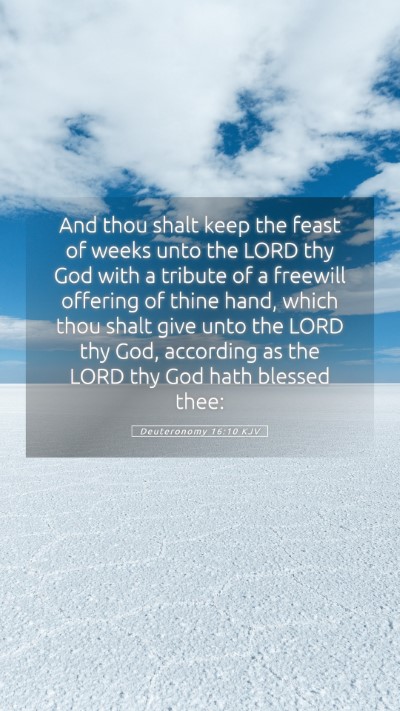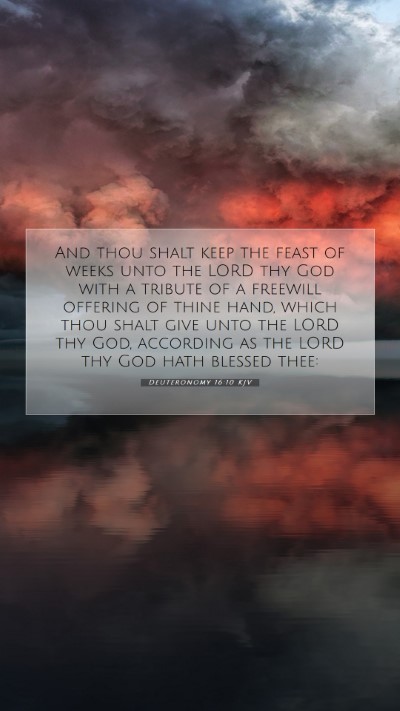Bible Verse Commentary on Deuteronomy 16:10
Bible Verse: "And thou shalt keep the feast of weeks unto the Lord thy God with a tribute of a freewill offering of thine hand, which thou shalt give unto the Lord thy God, according as the Lord thy God hath blessed thee." (Deuteronomy 16:10, KJV)
Understanding the Context
Deuteronomy 16:10 is part of a larger discourse in which Moses provides the Israelites with guidance on observing key religious festivals, particularly the Feast of Weeks, known also as Pentecost. This festival occurs seven weeks after Passover and serves as a celebration of the harvest and thanksgiving to God for His bountiful provisions.
Bible Verse Interpretations
The verse emphasizes the importance of offering to God, not just in terms of obligation but as an expression of gratitude for the blessings received. It reflects the principle of freewill offerings, implying that worship should stem from the heart and not merely from duty.
Commentaries on Deuteronomy 16:10
- Matthew Henry:
Henry underscores the idea that the gathering of harvest is a time to acknowledge God’s provision. He highlights that the observance of the Feast of Weeks is a celebration that requires both joyous participation and a heartfelt offering, as this reflects one’s personal gratitude for God’s blessings.
- Albert Barnes:
Barnes elaborates on the nature of the freewill offering, suggesting that it should correlate not only with one’s gratitude but also with the prosperity enjoyed during the year. His analysis reinforces the connection between divine blessing and human response in worship.
- Adam Clarke:
Clarke provides insight into the Hebrew word used for "weeks," relating it to the timing of the offering and its agricultural significance. He emphasizes that the feast is both a spiritual act of worship and a communal gathering to celebrate God’s faithfulness through the harvest.
Application of Deuteronomy 16:10 to Daily Life
Understanding this verse can guide individuals on how to express their own gratitude through generous giving, encouraging them to reflect on how they can bless others in light of the blessings they have received. Additionally, it serves as an encouragement to participate in communal worship and celebration, understanding that such acts unite communities in faith.
Bible Study Insights
For those engaging in Bible study groups, Deuteronomy 16:10 provides a rich foundation for discussions on offerings, gratitude, and God's faithfulness. It can inspire lessons on how to prepare our hearts for worship and take physical actions that reflect our spiritual convictions.
Cross References
- Exodus 23:16 – Discussing the Feast of Harvest
- Leviticus 23:15-22 – Outlining the observance of the Feast of Weeks
- 2 Corinthians 9:7 – Emphasizing the importance of giving from the heart
In-Depth Bible Verse Analysis
Engaging in an in-depth Bible verse analysis of Deuteronomy 16:10 involves understanding its historical context, the significance of the harvest in ancient Israel, and the continued relevance of such celebrations. It encourages believers to recognize periods of provision in their lives, fostering a practice of returning thanks through meaningful contributions.
Significance of Biblical Festivals
The festivals mentioned in the Old Testament details God’s design for His people to regularly pause, reflect, and celebrate His goodness. Understanding these festivals allows believers to appreciate their spiritual heritage and how the principles of gratitude and community resonate throughout Scripture.
Using Bible Study Tools
Employing Bible study tools like commentaries and concordances can deepen one’s understanding of verses like Deuteronomy 16:10. By examining the original language and context, readers can uncover layers of meaning that enhance their study and application of Scripture.
Conclusion
In summary, Deuteronomy 16:10 calls believers to remember God’s blessings through the act of giving and community celebration. As part of one’s Bible study lessons, this verse underscores the significance of a grateful heart and the importance of returning thanks to the Lord with offerings that reflect His goodness in our lives.


